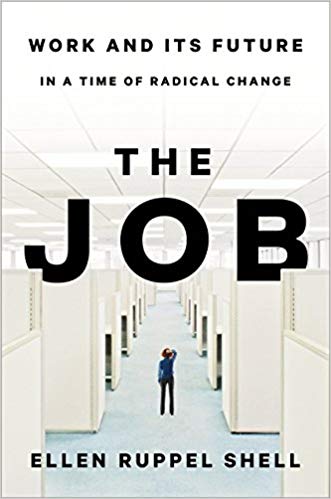You have /5 articles left.
Sign up for a free account or log in.
 The Job: Work and Its Future in a Time of Radical Change by Ellen Ruppel Shell
The Job: Work and Its Future in a Time of Radical Change by Ellen Ruppel Shell
Published in October of 2018.
This past Saturday I was shopping at a grocery store in the next town over from where I live. This supermarket has nine checkout lanes. Three were open. The grocery store was packed. It took a while to get through the line. The person scanning my items happened to be a manager. I asked her about all the closed lanes. She said that they have 14 openings for cashiers. That a bunch of people just quit. And that she can’t hire fast enough.
The way that I make sense of the world is through books. Having just finished Ellen Ruppel Shell’s The Job: Work and Its Future in a Time of Radical Change, I so wanted to have a conversation with this supermarket manager about that book. I might have, it hadn’t been for all the people behind me waiting to pay for their groceries.
The Job is such a fantastic, timely, thoroughly researched, balanced, and beautifully written book that I want everyone to read it. And then I want to talk to everyone who reads it about their experiences with their jobs, and the jobs around them.
Waiting in long lines at bricks and mortar retail stores is the new normal. At least where I live. So is the complete inability to find anyone at a store to help you find anything. Anyone who wonders why Amazon is destroying retail shopping hasn’t been to a store lately.
From Shell’s perspective, the reason that retail shopping is such a horrible experience is that retail jobs are so crummy. The reason that my local supermarket can’t find or retain workers is not that there is a shortage of people willing to work. Instead, there is a shortage of people willing to work for what the supermarket is willing to pay.
As Shell points, it doesn’t have to be this way. She profiles the supermarket chain Market Basket, which is known for treating its employees well in terms of salaries and profit sharing and family support, and whose stores are not understaffed.
Retail jobs, it turns out, don’t need to be bad jobs. This is a choice that we are making.
Would raising wages for low-skilled service jobs result in massive unemployment? The data that Shell shares in The Job do not support that conclusion. Companies that prioritize worker compensation and well-being seem to have a much better track record of sustainable profits than those that don’t.
What about the skills shortage for high-skilled work, such as jobs in science and technology? Like the concern that raising wages at the bottom will result in higher unemployment, the idea that we have a nation-wide skills shortage is also mostly a myth.
Our education system does a good job in STEM training. All those STEM job openings that large employers are constantly talking about are mostly a function of the wages that these employers are willing to pay. We don’t have a skills gap. We have a compensation gap. Pay wages that will attract and retain talented workers, and you will attract and retain talented workers.
Reading The Job, I kept thinking about how the forces that Shell describes that are causing so much anxiety and distress in the broader US labor market apply to our higher ed market for labor.
One of Shell’s big points is that we American’s tend to blame themselves for their employment troubles. We see insecure employment or job that don't pay enough to pay the bills as a function of our shortcomings. Shell suggests that we should be willing to look at the structure in which employment occurs as well as our own educational and work choices. A legal framework that offers little to now protections for employees will result in a system in which workers are easily disposed of. Technological change and global competition are hollowing out the middle of the labor market, leaving large numbers of unskilled low-paying service jobs and a few high-paid analytical ones.
In higher ed, we tend to see the challenges in the academic labor market as a result of forces largely beyond anyone’s control. There are way too few tenure track faculty jobs because of demographic headwinds and the cost disease. The market ultimately drives academic employment, and the market has spoken in favor or adjunct professors.
Perhaps we should be less quick to assume that the academic labor market that we have now is the one that we need or should have. It might be worthwhile to ask ourselves do we want a different type higher ed labor market, and what that might be?
Is it even possible for our community to (briefly) lay down our ideological orientations (from market loving to market skeptical) and academic employment beliefs (it is all our fault or all the school’s fault) - and have a different sort of discussion about our higher ed market for labor?
Can a truly exceptional book about a really big subject - the future of jobs in the US - enable us to have a conversation about jobs in our higher ed?
What books do you recommend about jobs across the economy, and jobs within academia?
Do academics who specialize in understanding the labor market ever turn their attention back on campus?
What are you reading?




